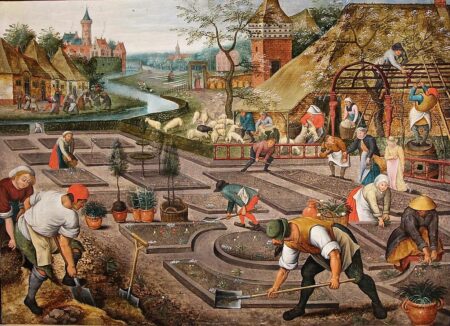- According to WWF, Solving the Great Food Puzzle involves, inter alia, nutritious indigenous crops, agrobiodiverse cropping systems, and traditional food cultures. Those are just 3 of 20 levers for food system transformation. Is it me or are levers and accelerators the current flavours of the month?
- Even the Gates Foundation agrees on that indigenous crop thing, kinda sorta, if you squint. In this piece, for example, Enock Chikava, Interim Director, Agricultural Development, waxes lyrical about teff.
- Meanwhile, in the middle of its tomato shortage, and not much interested in teff, the UK is betting on re-establishing prehistoric landscapes full of wild pigs and bison. Bold move.
- But who needs bison protein when you have the genome of the faba bean? Which after all is a nutritious indigenous crop, part of agrobiodiverse cropping systems, and a component of traditional food cultures.
- Ah, but you need to manage all that data on indigenous crops, and Clemson University is there to help. WWF take note.
Spring forward!
Pieter Breughel the Younger, CC BY-SA 4.0, via Wikimedia Commons
Brainfood: Seed imaging, Disease imaging, Seed traits, Irvingia shape, Mexican tomatoes, Fine cacao, Wine tourism, Wild peas
- Implication of high variance in germplasm characteristics. Last week’s Brainfood focused on genomic variation. This week, in contrast, we look at phenotyping. But not old school phenotyping, oh no. This paper, for example, uses fancy-ish, but not especially expensive, imaging.
- High-throughput imaging of powdery mildew resistance of the winter wheat collection hosted at the German Federal ex situ Genebank for Agricultural and Horticultural Crops. This paper uses somewhat fancier, and possibly more costly, imaging. Vorsprung durch Technik.
- Low availability of functional seed trait data from the tropics could negatively affect global macroecological studies, predictive models and plant conservation. Even embryos in seeds can be phenotyped.
- Agroforestry Trees’ Architecture as Evidence of Domestication: Case of African Mango Tree in the Dahomey Gap, West Africa. I wonder if one could describe the shape of tree crowns from space? I hope not, this work sounded like fun…
- Diversidad biocultural de tomate nativo en Oaxaca, México. Phenotype is socially constructed in tomato too.
- Who Defines Fine Chocolate? The Construction of Global Cocoa Quality Standards from Latin America. Can you standardise a social construct such as the flavour of chocolate, and would it help farmers? Maybe.
- Douro wine-tourism engaging consumers in nature conservation stewardship: An immersive biodiversity experience. How to make money out of a socially constructed phenotype.
- Natural range, habitats and populations of wild peas (Pisum L.). We should get out of our labs and look for wild peas in the oases of the Sahara Desert, the subalpine communities of Georgia, and the Asir Mts of Yemen. But will we know them when we see them?
Nibbles: ICRISAT breeding, India climate change, Seed catalogues, Karabakh horse
- New ICRISAT varieties of sorghum, pearl millet and pigeonpea are doing well in drought-hit Kenya. For now, at least: something to keep an eye on. Genebanks and breeding to the rescue?
- It’s behind a Times of India paywall, alas, but this seems to be an article about the effects of a very warm February on wheat, vegetables and grapes in that country.
- Spring is coming to the northern hemisphere, so of course The New Yorker has a piece on the allure of seed catalogues. I hope there are drought-tolerant and heat-resistant varieties in there. And that they’re clearly labelled as such.
- Meanwhile, oblivious of it all, AramcoWorld has an elegiac piece on the revival of the Karabakh horse in Azerbaijan. Beautiful plumage.
Nibbles: Vavilov, Argentine genebank, Millennium Seed Bank, Indian millets, Community seedbank, Creative finance, Healthy diets, African agriculture
- The Living Library of Resilience is a great name for what Nikolai Vavilov put together, and this longish piece from Maria Popova at The Marginalian is a great tribute to a great man.
- Vavilov’s example is being followed in Argentina, it seems, with the establishment of another genebank, in Corrientes.
- The Millennium Seed Bank reaches an important milestone. Vavilov would be proud.
- Can’t help thinking Vavilov would also wholeheartedly approve of grassroots Indian efforts to bring back millets, as usefully summarized The Locavore. Could have said a bit more about genebanks, though.
- Even genebanks like that of farmers such as Manas Ranjan Sahu. You don’t have to run an institute like Vavilov to build a genebank.
- The Global Alliance for the Future of Food and Transformational Investing in Food Systems Initiative (TIFS) have a report out on Mobilizing Money and Movements: Creative Finance for Food Systems Transformation. No genebanks in there either, alas, but there could so easily have been.
- FAO says billions of people in the world cannot afford a healthy diet, and it has the data to prove it. Does that mean genebanks are not doing their job (eg on nutrient dense orphan crops)? Or doing it too well (eg on the major calorie-rich staples)?
- African worthies say that we need to ramp up investment in the adaptation of agriculture on the continent to climate change. I hope that will include investment in Living Libraries of Resilience that conserve all manner of interesting local crops and varieties. And creative finance for them of course.
